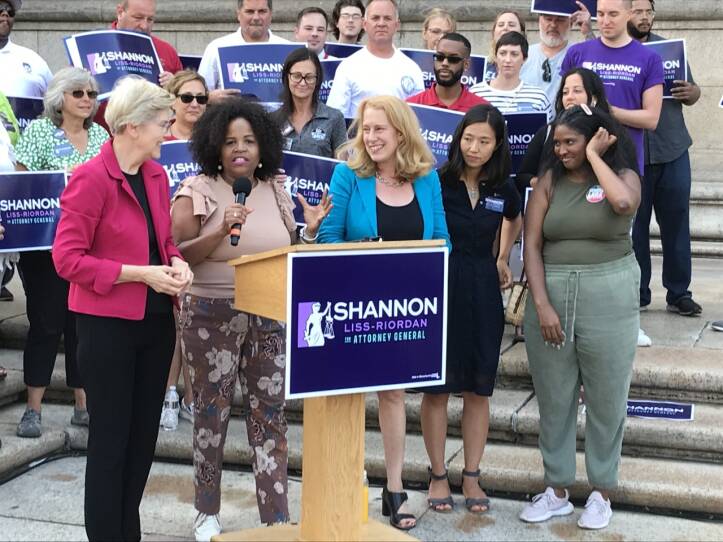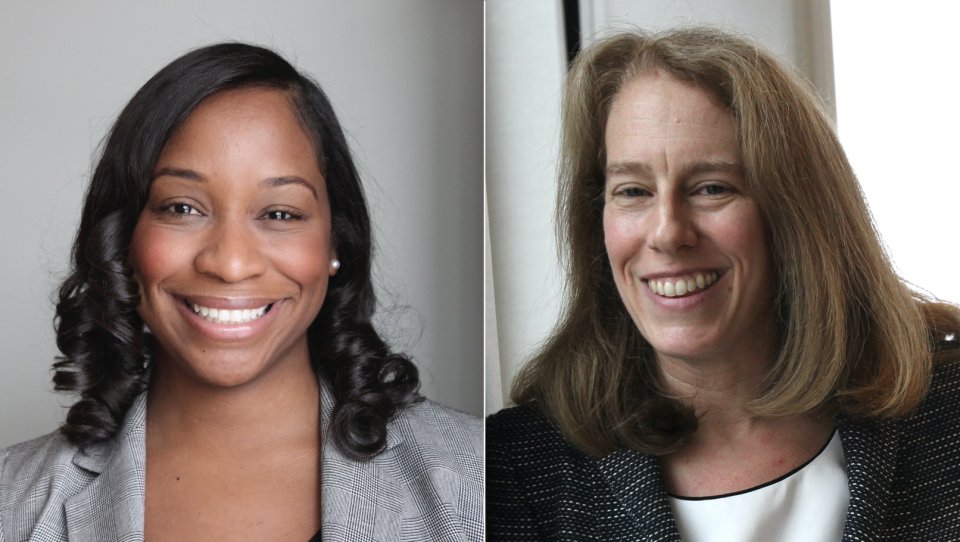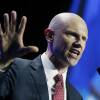Updated Tuesday, August 30 at 12:41 p.m.
When Andrea Campbell, who’s currently in a hard-fought race to become the Democratic candidate for attorney general, showed up at the Salvation Army’s Kroc Center in Roxbury for a campaign rally Saturday, she had two of the biggest names in Massachusetts politics with her. Congresswoman Ayanna Pressley, Campbell’s former colleague on the Boston City Council, gave an impassioned speech backing her candidacy. So did Maura Healey, the current attorney general — who’ll become the Democratic nominee for governor next week, and is the overwhelming favorite to be the state’s next governor.
Given how close the Democratic primary for AG is, support from both Pressley and Healey could be invaluable. A recent survey from the MassINC Polling Group found Campbell in a dead heat with labor lawyer Shannon Liss-Riordan, with 28% support from likely Democratic primary voters compared to Liss-Riordan’s 26%. But considering the contours of Massachusetts politics right now, it’s the Healey endorsement that really stands out.
Healey, after all, is the closest thing Massachusetts has to an inexorable political force. And as she coasts towards the corner office, she’s telling any voters who’ll listen that Campbell is her natural successor. “I know what it means to be attorney general,” Healey said in Roxbury. “I know that job. And I sure know who the next attorney general should be.”
Tatishe Nteta, a political-science professor at UMass Amherst and the director of the UMass poll, noted that Healey’s endorsement could be especially helpful to Campbell in the western part of Massachusetts, where she’s not well known. It is, he added, a highly unusual show of public support.
"Incumbent and former presidents don't ever support a presidential candidate during the primaries," Nteta said. "You rarely see that, even in congressional elections, that individuals who are still in office select a person in the primaries to be their successor. I’m not a soothsayer, but I think this endorsement is going to be extremely helpful.”
Healey's endorsement is predicated, in part, on her belief that Campbell’s personal background is an important qualification in its own right. In last year’s Boston mayoral race, in which she finished third in the preliminary election, Campbell frequently spoke about her difficult childhood, which included an incarcerated father, stints in foster care, and the death of her twin brother, Andre, who passed away while being held in pretrial detention by the state.
At the Kroc Center, Healey said that background gives Campbell “a capacity to understand the issues, to understand the people, to understand the nature of the fights that we are in." When Campbell spoke, she referenced her biography too — but with a twist, in which her life’s arc became a feel-good testament to Massachusetts exceptionalism.

“Why do I know we live in the best state in the nation?” asked Campbell, who’s seeking to become the first Black woman elected statewide. “I am living proof of that — that a girl who grew up in public housing, in a family torn apart by incarceration and poverty, can not only become the first in her family to go to college, or the first in her family to go to law school, but to be a candidate for attorney general in Massachusetts in this moment.”
Liss-Riordan is offering a very different rationale for her candidacy, in which professional experience is the focus and personal biography is an afterthought. In a recent phone interview, as she traveled to western Massachusetts to campaign, she summed it up: “I’m asking residents of Massachusetts: put my resume side by side with the other candidates in the race, and ask yourself, who would you hire to be your lawyer?”
That resume, Liss-Riordan notes, includes scores of lawsuits brought on behalf of workers against big corporations, including American Airlines, Starbucks, and gig-economy giants Doordash, Grubhub, Uber, and Lyft. Also on Liss-Riordan’s enemies list: the now-defunct local pizza chain the Upper Crust, which she successfully targeted for violating minimum-wage and overtime laws.
The problem, for Liss-Riordan, is that the current AG is telling Massachusetts residents to hire the other lawyer. Asked how that’s impacted her campaign, Liss-Riordan, who previously ran for the U.S. Senate against then-Congressman Ed Markey, didn't directly answer.
“Maura Healey has been a terrific attorney general,” Liss-Riordan replied. “I’m really excited about the work that she has done, and I am excited about this opportunity to step into her shoes and continue and expand on her important work. [But] I’m talking to the voters. I’m not really focused on any particular endorsements.”
Still, Liss-Riordan is finding other ways to push back. A few hours after Campbell appeared with Healey and Pressley, Liss-Riordan stumped at the Boston Public Library in Copley Square with U.S. Senator Elizabeth Warren, Boston Mayor Michelle Wu, and Kim Janey, Boston’s former acting mayor. (Wu and Janey were opponents of Campbell’s in the mayoral race last year.)
Wu, who spoke first, touted Liss-Riordan’s personal warmth to the crowd gathered at the BPL steps. “But don’t be fooled,” Wu added. “This woman is known across the country as ‘The Sledgehammer’ — raining down justice and the full force of the law on those who need to be held accountable.”
As with Campbell, any big-name boosters Liss-Riordan can land could help her eke out a win on September 6. The nod from Warren looms especially large, since Warren, like Healey, has a record of running and winning statewide. It’s not clear, though, that Warren plans to work nearly as hard for Liss-Riordan as Healey does for Campbell. This past weekend, Healey appeared with Campbell five times. Warren appeared with Liss-Riordan once.

The other thing Liss-Riordan has going for her is money — lots of it. Campaign filings show she gave her campaign $2.5 million in July alone, helping to fund a media blitz that's been hard for voters to escape. In recent weeks, Nteta of UMass said, voters have been "bombarded" by TV commercials, web ads and direct mail plugging Liss-Riordan's candidacy. Campbell’s once-substantial lead has vanished, and the share of likely Democratic primary voters who say they’ve never heard of her has dropped sharply, from 72% in June to 46% now.
Campbell can’t compete with Liss-Riordan when it comes to personal wealth. What she can do — and is doing — is suggest there’s something untoward about Liss-Riordan making millions of dollars as she represents low-paid workers. In Roxbury, Campbell told her supporters that after finishing law school at UCLA, “I came back home and started my career representing children for free. Not making millions — for free.”
Liss-Riordon’s response, basically, is that that’s the way class-action litigation works. “The system that we have allows working people, regular people, consumers, to get legal representation that they would not be able to afford otherwise,” she said. “My clients would never be able to afford hiring a fancy white-shoe law firm. ... That’s what I’ve devoted my career to, and I’ve been really good at it.”
The third candidate in the race, Quentin Palfrey, surprised many observers and activists by suspending his campaign and endorsing Campbell on Tuesday, the same day Campbell was endorsed by the Boston Globe.
Palfrey, who was the Democratic nominee for lieutenant governor in 2018, is a former Massachusetts assistant AG who also served in the Obama and Biden administrations. He received the official endorsement at the Mass. Democratic Party’s convention in June, and a case could be made that he was the most progressive candidate in the race before exiting. Like Liss-Riordan, but unlike Campbell, he supports single-payer health care, supervised injection sites and keeping the state's cap on charter schools. Palfrey also backs eliminating qualified immunity for police, a step Liss-Riordan isn't prepared to take. Still, when he ended his run, Palfrey's prospects looked bleak: the same MassINC poll found he was supported by just 10% of likely voters.
As the clock ticked down, Palfrey had tried to shake up the race with some attention-getting new proposals. In an online-only ad, he said he’d investigate the beleaguered MBTA system as AG. And he called on the Legislature to take aggressive action on campaign-finance laws in Massachusetts. That demand was a clear jab at both Liss-Riordan’s prolific self-funding and a super PAC, boasting several conservative donors, that backed Campbell’s 2021 mayoral bid — something Palfrey had suggested for months would create crippling conflicts of interest if she becomes attorney general.
When he endorsed Campbell, though, that concern seemed to have faded away. In an emailed statement, he said Campbell’s “lived experience...allow[s] her to connect with families across the commonwealth” and said that, as AG, she’ll “be a fighter for justice for all.”
The hope, for Campbell, is that Palfrey’s exit and endorsement will give her yet another advantage heading into exit day. But it’s not at all certain that Palfrey’s former supporters will follow his lead.
Zelda MacGregor, a Democratic State Committee member who represents the Plymouth and Barnstable district and is also a member of the group Progressive Mass, said after Palfrey’s announcement that she’d already voted early for him — and now fervently wished she hadn’t.
“I find this disingenuous, and if anything, it adds insult to injury,” MacGregor said of Palfrey’s decision to back Campbell. “It’d be nice if he’d told us about how he felt about Andrea sooner, so I could have voted for Shannon.”
If enough Palfrey backers feel the same way, his late-breaking move could prove decisive — but not in the way he and Campbell hope.
Update: This story was updated following Palfrey’s announcement that he was dropping out.








